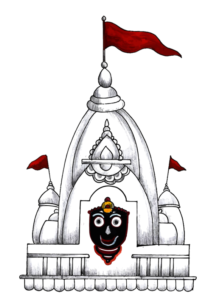
only temple in the world dedicated to Lord Mangala
Mangalnath Mandir
Celestial Connection and Spiritual Serenity
Abstract :
The Mangalnath Temple, situated in the heart of Ujjain, Madhya Pradesh, is a place of profound religious significance and a hub for astronomical enthusiasts. Dedicated to Lord Mangala, the presiding deity of Mars, this temple offers visitors a unique blend of spirituality and scientific curiosity. This research article explores the temple’s history, astrological connections, religious rituals, and its serene location by the Shipra River.
Introduction :
Ujjain, a city steeped in history and spirituality, is home to the Mangalnath Temple, a shrine that holds an exclusive place in Hinduism as the only temple in the world dedicated to Lord Mangala, the celestial embodiment of Mars. Nestled on a hillock along the picturesque banks of the Shipra River, the temple is a fusion of spiritual devotion and astronomical marvel, attracting pilgrims, astrologers, and history enthusiasts from far and wide.
Historical and Mythological Significance :
The Mangalnath Temple’s history can be traced back through centuries and is said to have been rebuilt by the Scindia royal family. According to the Matsya Purana, its sacred grounds mark the place where Lord Shiva engaged in a fierce battle with the demon Andhakasura. During this epic confrontation, a drop of sweat from Lord Shiva’s brow fell upon the earth, giving rise to the sacred Shiva Linga enshrined in the temple. This mythological account makes the temple a place of paramount importance in Hindu mythology.
Astronomical Marvel – Mars’s Birthplace :
The temple is also renowned as the birthplace of Mars, the ‘mangala’ in Hindi. Its unique position allows for a clear view of the red planet and offers an exceptional location for astronomical observations. Researchers and enthusiasts often visit the temple to study the celestial bodies, making it a site of religious reverence and scientific inquiry.
Religious Significance :
Mangalnath Temple plays a crucial role in mitigating the adverse effects of Mars (known as ‘mangal dosh’) in an individual’s horoscope. Devotees throng to the temple to perform Mangalnath Puja, seeking solace from malefic planetary influences. The temple is also famous for the ‘Bhaat Puja,’ an important religious observance, and is a destination for newlywed couples looking to perform rituals to neutralize the ill effects of Mars in their horoscopes.
Mangalnath Temple Campus :
Adjacent to the temple, the Kaliyadeh Palace stands on an island in the Shipra River. Built by the rulers of Mandu in 1458 AD, this palace bears Persian influences in its architecture. It once hosted visits from Emperor Akbar and Jahangir. Today, the palace’s splendor has faded with the passage of time.
The Pir Matsyendranath, an ancient site built in memory of Matsyendranath, the great leader of the Nath sect of Shaivism, is another attraction along the Shipra’s banks. It has roots dating back to the 6th or 7th century BC and remains a significant place of reverence.
Visiting Mangalnath Temple :
• By Air: The nearest airport is Maharani Ahilya Bai Holkar Airport in Indore, approximately 56 km from Ujjain.
• By Train: Ujjain Junction Railway Station connects the city to major railway routes in the country, and local transportation is available to reach Mangalnath Temple.
• By Road: Regular bus services operate between Ujjain and major cities in Madhya Pradesh. Superfast and deluxe buses are also available. The city is accessible via various road routes like Agar Road, Indore Road, Dewas Road, Maksi Road, and Badnagar Road.
Conclusion :
The Mangalnath Temple in Ujjain exemplifies the harmonious coexistence of religion, history, and science. With its intriguing astrological connections, historical roots, and serene riverfront location, this temple is not only a spiritual haven but also a hub for scientific enthusiasts exploring the cosmos. Whether you seek to offer your prayers, study celestial bodies, or immerse yourself in history, Mangalnath Temple provides a unique and fulfilling experience.
Editor – Kaalchakra Team
[ Note – Before Concluding anything as a Finale, Please Go through Original Scriptures of Vaidik Literature Written in Sanskrit and Also with Meaning of That time of Language. Because English is a Limited language to Explaining the Deeper Knowledge of Vaidik Kaal. ]
